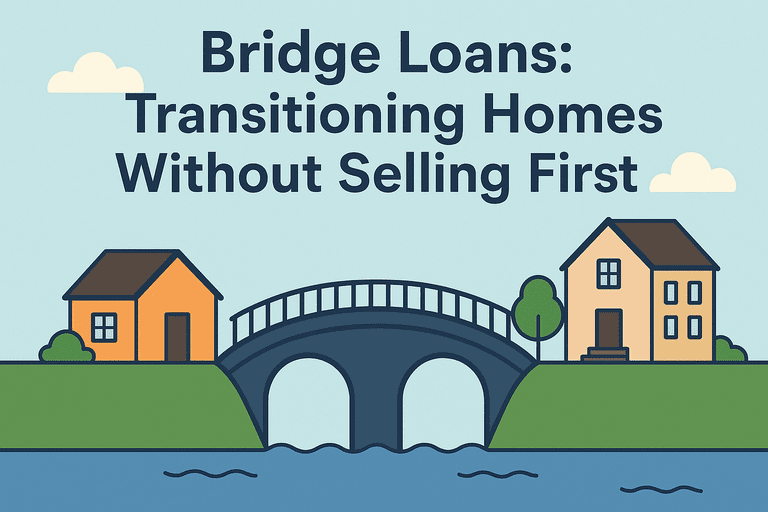Buying a new home while still owning your current one can feel like walking a financial tightrope. A bridge loan can make that transition smoother by providing buy before sell financing—allowing you to secure your dream property without waiting for your current home to sell. This short-term lending solution acts as a temporary home loan, giving you the funds you need to move forward with confidence.
In this guide, you’ll learn exactly how bridge loans work, their pros and cons, and what alternatives exist—so you can decide if this financing option fits your unique home-buying journey.
What Is a Bridge Loan?
A bridge loan is a short-term financing option designed to “bridge” the gap between buying a new home and selling your current one. It allows homeowners to access equity from their existing property to use as a down payment or cover closing costs on a new purchase.
Typically lasting six months to one year, these loans are secured against your current property, your new home, or both. Because of their short repayment period, interest rates for bridge loans tend to be higher than traditional mortgages, but the flexibility they offer can be invaluable.
How Buy Before Sell Financing Works
With buy before sell financing, the lender advances you the money you’ll eventually receive from selling your existing home. This enables you to:
Make a non-contingent offer on a new property (making your bid more competitive)
Avoid the stress of moving twice or renting temporarily
Take time to sell your current home for the best price rather than rushing a sale
For example, if you have $200,000 in equity in your current home, a lender might offer you up to 80% of that equity to use toward your new purchase. Once you sell your old property, you repay the bridge loan in full.
Types of Bridge Loans
Closed Bridge Loan – Both the purchase and sale dates are set in advance. This is lower risk for the lender and often comes with better rates.
Open Bridge Loan – The sale date of your current home isn’t fixed yet. While this gives you more flexibility, it usually comes with higher interest rates.
Benefits of a Bridge Loan
Immediate access to equity without waiting for your home to sell
Stronger negotiating position in competitive housing markets
Flexible repayment options—some lenders require monthly payments, others allow lump-sum payoff after the sale
Risks and Drawbacks
Higher interest rates than traditional mortgages
Origination and closing fees can add thousands to the cost
Repayment pressure if your home takes longer to sell than expected
Alternatives to a Bridge Loan
Before committing, consider these temporary home loan alternatives:
Home Equity Line of Credit (HELOC) – Lower rates, but you must qualify while still owning your current home.
Home Equity Loan – Lump-sum payout with a fixed interest rate.
Personal Loan – Good for smaller amounts but may have shorter terms and higher rates.
Contingent Offer – You make your purchase contingent on selling your current home, though this can weaken your bargaining position.
Who Should Consider a Bridge Loan?
A bridge loan might be right for you if:
You’ve found your next home and don’t want to risk losing it
You have significant equity in your current home
You’re confident your home will sell quickly
You need to relocate for work or personal reasons
Tips for Getting the Best Bridge Loan
Shop multiple lenders—rates and fees vary widely
Negotiate terms to allow flexibility in repayment
Have a backup plan in case your home sale takes longer than expected
Work with an experienced mortgage broker who understands complex transactions
Conclusion: Is a Bridge Loan Worth It?
A bridge loan can be a powerful tool when you need to buy before you sell—but it’s not a one-size-fits-all solution. Weigh the costs, benefits, and risks carefully. By exploring PMI alternatives, HELOCs, and other options, you can ensure your financing choice supports both your short-term move and your long-term financial health.
For personalized numbers and repayment projections, try the Bridge Loan Calculator at CalculatingAmortgageLoan.com.
Sources:
